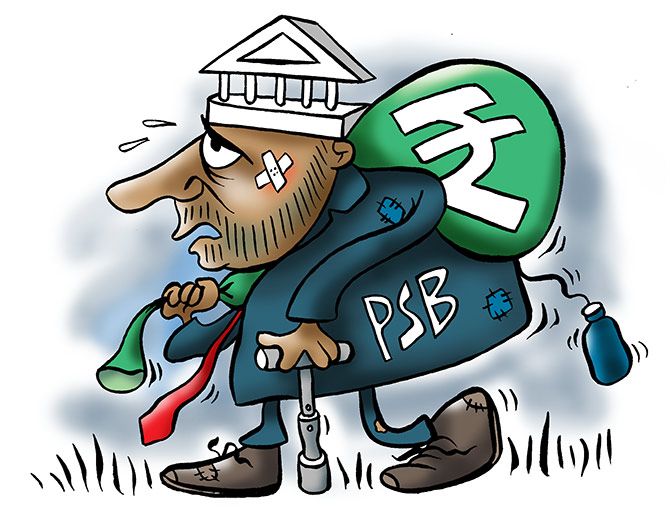RBI may be inclined to impose severe restrictions on lending in the coming quarters.
Illustration: Uttam Ghosh/Rediff.com

The Reserve Bank of India (RBI) may hand out diktats similar to the one given to Dena Bank to more banks under its prompt corrective action (PCA) framework.
Apart from Dena Bank, the credit and financial profiles of Bank of Maharashtra, Oriental Bank of Commerce, Allahabad Bank and UCO Bank are in bad shape - all these are under PCA.
None of the five has reported any improvement in their recently declared January to March quarter results, as the level of net non-performing assets (NPAs) remained high and return on assets (RoA) remained in the negative in 2017-18.
Their capital adequacy is in line with Basel III norms due to heavy equity capital infusion by the government, their promoter, since 2015-16.
A substantial portion of their net worth has been used to provide for the rising pool of non-performing assets (NPAs).
In all, 11 state-owned banks are under PCA. The government is slated to conduct a review of some of them on Thursday (May 17).
A person heading the financial sector at an Indian rating agency said there were no reasons to believe what happened with Dena Bank would not be applicable to other banks under PCA.
Their performance continues to be under pressure, showing high risks of further deterioration.
Another top executive with a south-based bank, also under PCA, said the RBI’s abrupt decision in February to scrap restructuring schemes, including strategic debt restructuring, came as a blow.
As a consequence, NPAs - gross and net - grew substantially in the fourth quarter.
And, hence, the RBI may be inclined to impose severe restrictions on lending in the coming quarters.
Other banks under PCA - IDBI Bank, United Bank, Corporation Bank, Bank of India, Central Bank of India and Indian Overseas Bank - are yet to declare their results for the fourth quarter and for 2017-18.
While taking the decision on putting a bank under PCA, the RBI assesses the lender’s capital adequacy ratio (CAR), NPAs and RoA.
Banks become PCA candidates when they breach the minimum requirements of CAR, their net NPAs rise above 6 per cent, or the RoA is negative for two years.
Breaching any one condition is seen sufficient for triggering PCA.
Those under PCA face restrictions on expanding their loan book, as the aim is to turn the bank around and improve financial and credit profiles.
Banks are pinning hopes on substantial recoveries from large accounts that are in the National Company Law Tribunal (NCLT) for resolution under the Insolvency and Bankruptcy Code. But profits may be elusive.
Bankers involved in the recovery process are sceptical about the promptness of the NCLT. Various benches of the tribunal are facing work pressure and it is taking three-four months for cases to be admitted.
“Perhaps the NCLT is going the debt recovery tribunal way, which was mired in a huge backlog and delays,” said a person heading recovery at a Mumbai-based PSB.
Plus, there is a tendency among borrowers (who have lost control over their company) and companies in the fray to purchase assets to approach the National Company Law Appellate Tribunal and the Supreme Court to engage in litigation, delaying the process further.











